How to improve your pet’s diet
People often ask how they can improve the quality of their pets’ diet whilst enjoying the convenience of commercially prepared diets. This blog is to encourage and support those looking for a starting point for ideas to make the daily practice of feeding your pets a more satisfying task if you are unable to adopt the optimum regimen for any reason.
Without having to understand complex terminology and physiology I encourage all my clients to trust their instincts when providing food to their pets and also to suggest that even the simplest of additions of occasional real foods can greatly enhance the quality of diets and provide some health benefit. It is much easier to get animals to eat real foods if you start them young of course so be patient with older pets and start with items you already have at home so as not to waste precious time, money or food.

Food is medicine and it is not complicated.
Many of us get worried about the properly balanced diet without realising that most things being sold to us with this claim are really not well balanced at all but generally sufficient to keep animals alive but not to thrive.
I want all animals to eat better so here are some simple tips.
If you AVOID cooked bones, cooked fat, onions, sugar and chocolate you can feed your cat or dog any food that you have left over ….even if it is cooked.
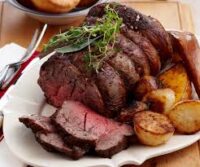
This is how these animals co-existed with us for centuries…..of course raw foods are better for them but our leftovers are often better than anything in a package or a tin. You can get around this by keeping the off cut trimmings from any meat you are preparing and give them that before you cook your dinner/BBQ. Raw fat is best for them never cooked fats if you can avoid that. There are many people scared of pancreatitis reoccurrences in dogs but do not be worried about raw fat….it is an essential component of the dog/cat diet.
Fat is the only essentially raw ingredient that cannot be compromised and if you are not using it then you need to have a carbohydrate substitute for growing/active/younger dogs.
Of course, ALL commercial pet foods, kibbles, tins have carbohydrate so you never need to add any carbohydrate even though the odd piece of vegemite toast, ice cream or pizza crust can be overlooked now and then.

There is an alarming and ridiculously lengthy list of things that are apparently not safe to feed cats and dogs but in my professional opinion most of these result from chemical adulterations with sprays and chemicals (that are making us all sick!).
The latest in a long list are grapes/raisins and whilst the mechanism of renal failure in dogs with these fruits is still unidentified, I posit that organic/chemical free fruits are all safe. You can’t be sure how clean they are unless you grow your own or get certified organic produce which can ironically be cheaper these days owing to supply/transport issues.
If in doubt..leave it out.
Personally, I don’t recommend the nightshades but there is no reason dogs and cats should not eat tomato, potato and eggplant if they are inclined. In fact the lycopene in tomato is a very good eye nutrient and tinned mackerel in tomato sauce is a good food for dogs for cataract prevention/treatment and cats as an occasional treat.
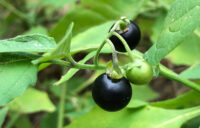
If the berries from the ubiquitous potato bush are very ripe and fall off into your hand they are an inexpensive and good option for a host of beneficial nutrients. I was naturally wary of these black berries as they do resemble the deadly nightshades and we must sure to differentiate them. Deadly nightshade is not grown in Australian gardens which is a huge relief and for those unsure of the difference there is a nice explanation here. I also recommend cooking potato/sweet potato to help make it more digestible.
The list of what you can add to your pets regular food whether you choose kibble or any other base is quite extensive and will be listed here for anyone looking to improve health in their pets. Choose anything from any category and I will also indicate for specific problems what may be best.
I cannot overemphasise the importance of a healthy gut biome so occasional additions of anything from the bottom of this list will be highly recommended in all dog and cat diets.
They only need very small amounts infrequently but if they ask for more, give extra.
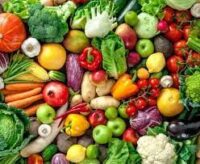
You do not ever need to supplement cats and dogs with carbohydrates, cooked fats or sugar. In fact these things will cause digestive upsets. Any fruit/vege that you eat yourself is fine to give them as treats or supplements.
Pulp from your own juices or smoothies is an excellent addition to their food bowl with or without yoghurt (plain). They can also be frozen as ice treats in hot weather.
In order of quantity required the foods are listed here for both cats and dogs alike. For the purposes of augmenting an existing base diet you may already have for your pet simply pick an item from this long list and offer it to the animal. I do think it is best to keep raw items separate from cooked ones so feed them in separate meals whenever possible to minimise digestive workload.
Raw meaty appropriate bones (no marrow or large leg bones) and bone must be less than 20% of the portion (10-20%)……….’trophy chew’ raw knuckle bones are toys and not food but excellent distractions for teething puppies. Large/adult dogs do well with MEATY portions with some bone from the body of the prey, necks, wings, ribs, brisket for dental hygiene and brain health.
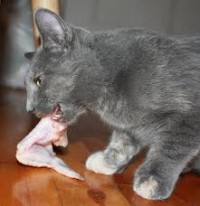
Extra MEAT of any kind including duck/chicken feet, fat, gristle etc. Not bacon/ham/processed meats as they are not raw and also contain too many additives…tiny bits will not hurt usually but will aggravate sensitive gut/skin.
OFFAL….kidney/liver/heart…for minerals and essential fatty acids.. very small portions or air/freeze dried good.
If you are feeding any commercial diet (cooked or raw) then all of the things above are already provided in some form however the following ingredients are hardly ever provided in sufficient amounts to be of any help even when they are advertised as ingredients in premium or holistic pet kibble. Bones cannot ever be given unless they are raw so other calcium sources are used in these packaged foods to compensate.
Raw vegetable pulp, vitamised greens or other fruits/vege…..especially important for phytochemicals and antioxidants in any animal with inflammation….dermatitis/skin problems, gastritis/colitis/gut problems, cancer or arthritis…all need antioxidants.
Old dogs especially need more veg material and cancer patients do well with berries.
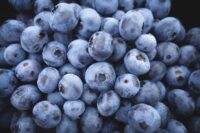
Tomato for eye health, beetroot for kidney/bladder problems, turmeric for any inflammation, quercetin in dark berries and apples because onion is problematic /toxic in dogs.
Garlic is good. Leafy Greens blended as a green smoothie does wonders for any dog/cat.
Cats are more fussy but will take some of these things especially cooked pumpkin.
Cooked vege is also better than none at all but dogs and cats do not need grains or rice unless they have extra energy demands or are not getting enough raw fat in their diet ie; any young to mid aged animal that eats cooked diets will probably need some carbs unless you are giving raw meaty bones treats quite often.
Culinary herbs and edible weeds like nettles/dandelion are also excellent nutrient boosts to put into vitamised greens or food bowls…..dogs and cats will graze these things themselves too.
You can make these green smoothies into ice blocks and add to meals every now and then or as treats on hot days.
You can use any frozen vege as training treats for dogs if you start them young enough or they are food motivated and you can feel good about offering healthy inexpensive treats.

Omega 3 fatty acids/Fish Oil…….can be added to any pet food once or twice a week
Fatty fish like mackerel or tinned sardines or your own fish oil capsules are all OK for cats and dogs. Unflavoured fish oil is best 500g for each 5kg. Fish oil capsules can also be used as training treats for dogs.
Prebiotic….the substrate for a healthy gut biome…..supports the probiotics
Prebiotics are soluble fibre like oat bran, chia seed and other seed meals, flax meal, coconut crunch etc A tablespoon of soaked chia seed once a week or two will keep dogs anal glands healthy by bulking the stool. Many kibble fed dogs have unformed or soft stool so increase these soluble fibres….psyllium husk is also a popular choice and fibrous vege pulp is also good.
Small quantities of sprouted grains or grass, wheatgrass, spirulina, barley grass powders.
If your pet has yeast infections in ears/paws/anus then chlorella tablets or powder should be added 500g for every 5kg for a few weeks as this will clear Malassezia/yeast.
Fermented foods like miso, sauerkraut, kimchi, apple cider vinegar keeps the gut healthy…don’t give large quantities unless they are used to them..a very little is sufficient.
Raw egg with shell, cottage cheese or yoghurt
Digestive enzyme/green tripe can protect from pancreatitis
Cats can have anything mentioned above but are notoriously fussy and you may find it is easier to just offer them a raw or very lightly cooked chicken wing, drumette, some offal, tinned or fresh fish , yoghurt, raw egg, cottage cheese as adjunct nutrients to enhance the quality of any other foods they are receiving. They will often drink leftover soups or broths or gravy.. not with cooked fat. Cats can be lactose intolerant so do not give them dairy if it causes loose stool.
Plain yoghurt is usually Ok however and quite beneficial to health and vitality.
As unpleasant as it may sound….fresh caught mice are manna from heaven for the average feline so if you are having mouse problems please do not use poisons but invest in some Australian made humane traps that have quick kill capacity and your cat will be ecstatic if it is not overfed already.

The main thing to remember is that real fresh food, cooked or raw is always better than packaged foods and anything at all that you add however infrequently will improve the quality of the diet of your pet. Get used to giving them small treats of real foods and soon they will be showing improvement in health/coat/eyes/allergies/arthritis symptoms.
If you do decide to pursue raw feeding options fortunately there are now more and more good local suppliers that home deliver ready prepared, taking the hard work out of the task for you….look at Raw and Fresh prepared packs or Barking Good or BM foods to name a few.
Your pets will thank you for any special effort you make by being happier and healthier and this will have a flow on effect to the rest of the family. The main thing to remember is that any addition of real fresh food is helpful to any diet and the exceptions are very few.